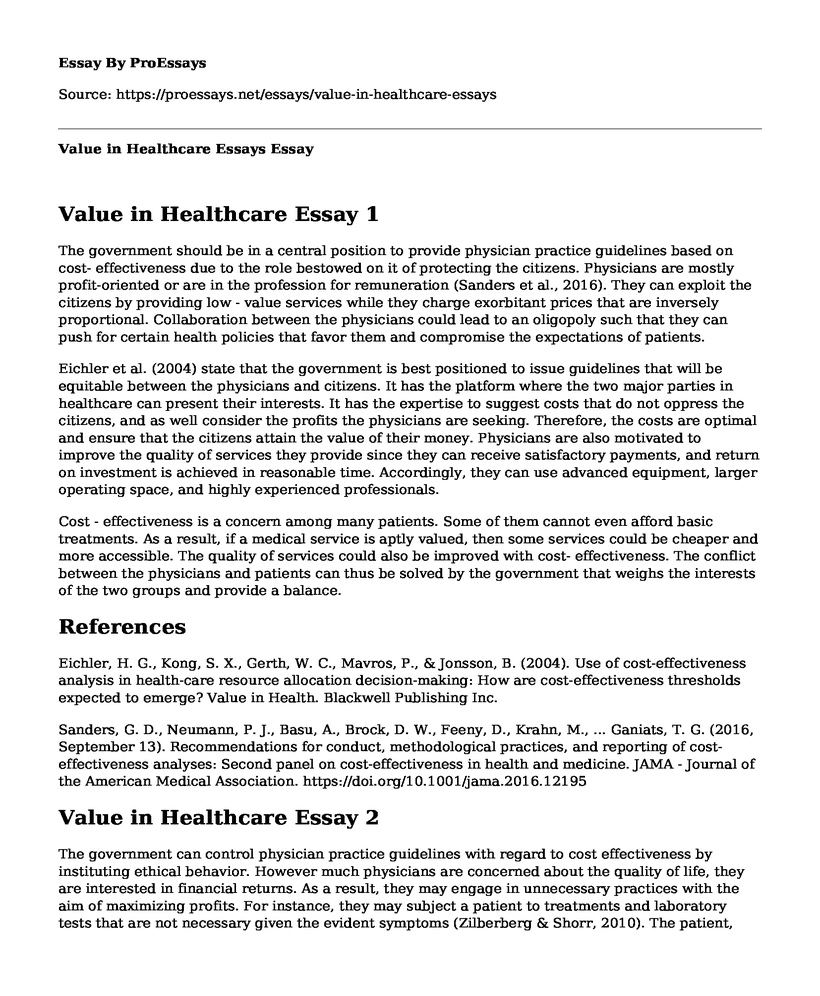Value in Healthcare Essay 1
The government should be in a central position to provide physician practice guidelines based on cost- effectiveness due to the role bestowed on it of protecting the citizens. Physicians are mostly profit-oriented or are in the profession for remuneration (Sanders et al., 2016). They can exploit the citizens by providing low - value services while they charge exorbitant prices that are inversely proportional. Collaboration between the physicians could lead to an oligopoly such that they can push for certain health policies that favor them and compromise the expectations of patients.
Eichler et al. (2004) state that the government is best positioned to issue guidelines that will be equitable between the physicians and citizens. It has the platform where the two major parties in healthcare can present their interests. It has the expertise to suggest costs that do not oppress the citizens, and as well consider the profits the physicians are seeking. Therefore, the costs are optimal and ensure that the citizens attain the value of their money. Physicians are also motivated to improve the quality of services they provide since they can receive satisfactory payments, and return on investment is achieved in reasonable time. Accordingly, they can use advanced equipment, larger operating space, and highly experienced professionals.
Cost - effectiveness is a concern among many patients. Some of them cannot even afford basic treatments. As a result, if a medical service is aptly valued, then some services could be cheaper and more accessible. The quality of services could also be improved with cost- effectiveness. The conflict between the physicians and patients can thus be solved by the government that weighs the interests of the two groups and provide a balance.
References
Eichler, H. G., Kong, S. X., Gerth, W. C., Mavros, P., & Jonsson, B. (2004). Use of cost-effectiveness analysis in health-care resource allocation decision-making: How are cost-effectiveness thresholds expected to emerge? Value in Health. Blackwell Publishing Inc.
Sanders, G. D., Neumann, P. J., Basu, A., Brock, D. W., Feeny, D., Krahn, M., ... Ganiats, T. G. (2016, September 13). Recommendations for conduct, methodological practices, and reporting of cost-effectiveness analyses: Second panel on cost-effectiveness in health and medicine. JAMA - Journal of the American Medical Association. https://doi.org/10.1001/jama.2016.12195
Value in Healthcare Essay 2
The government can control physician practice guidelines with regard to cost effectiveness by instituting ethical behavior. However much physicians are concerned about the quality of life, they are interested in financial returns. As a result, they may engage in unnecessary practices with the aim of maximizing profits. For instance, they may subject a patient to treatments and laboratory tests that are not necessary given the evident symptoms (Zilberberg & Shorr, 2010). The patient, insurer, or government paying the money will be forced to compensate for services that were dispensable. Fundamentally, the payment is exaggerated, which insinuates that money that would have been spent on a patient who sincerely required it, it is wasted and thus cost inefficiency. The physicians would also be guided by engaging practices that are cost- effective for a specific case where there can be alternatives for treating the patient. Consequently, sophisticated procedures that are not cost effective but would lead to treatment are reserved for severe cases.
Guidelines by the government also ensure that available resources are appropriately used. When the government intervenes in the practices, physicians would avoid using equipment that are not paramount for a particular service. Phillips and Chen (2002) assert that there is an inadequacy in the capacity of resources owned by physicians. When they are appropriately used, the equipment can serve the patients who deserve to use them without the equipment straining or being needlessly occupied.
The government is the only party that can enforce such guidelines. It can use the powers it has to ensure that constructive cost effectiveness by embracing ethical values among physicians can be attained and sustained. I, therefore, believe it should be at the centre of establishing such regulations bearing the interests of its citizens.
References
Phillips, K. A., & Chen, J. L. (2002). Impact of the U.S. Panel on Cost-Effectiveness in Health and Medicine. American Journal of Preventive Medicine, 22(2), 98-105. https://doi.org/10.1016/S0749-3797(01)00409-3
Zilberberg, M. D., & Shorr, A. F. (2010). Understanding cost-effectiveness. Clinical Microbiology and Infection. Blackwell Publishing Ltd. https://doi.org/10.1111/j.1469-0691.2010.03331.x
Cite this page
Value in Healthcare Essays. (2022, Jun 19). Retrieved from https://proessays.net/essays/value-in-healthcare-essays
If you are the original author of this essay and no longer wish to have it published on the ProEssays website, please click below to request its removal:
- Paper Example on Politics And Health Policy
- Courts' Challenges: Underfunding Essay Example
- Why women live longer than men?
- Essay Sample on Justice in States and Souls: Plato's Stance
- Rational Choice Theory: Why Individuals Choose - Essay Sample
- Paper Example on Dementia: A Global Crisis - Canadian Strategy for Action
- Licensed Dietitians in South Carolina: Understanding the Dietetics Licensure Act - Free Essay







